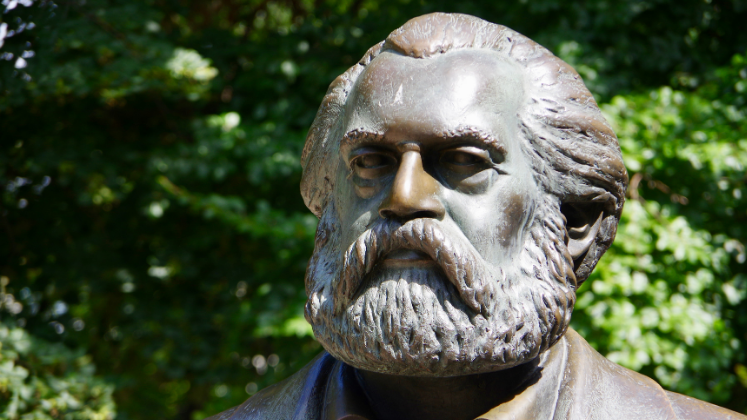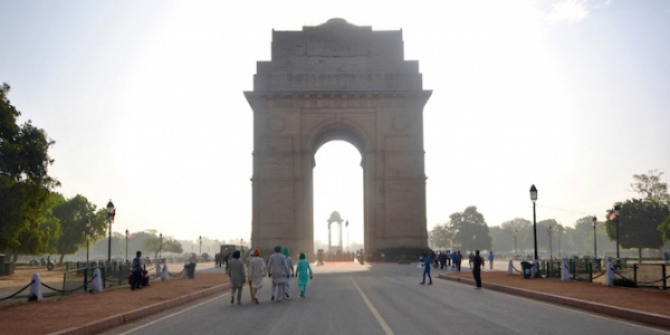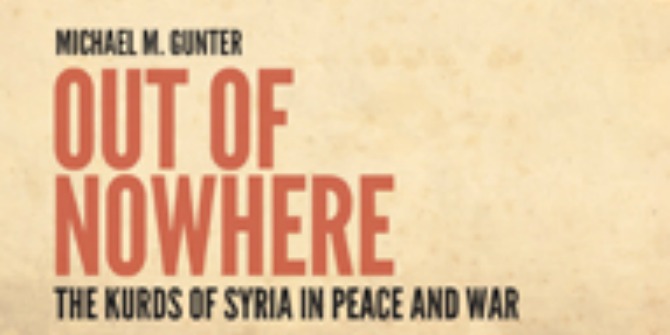Michael Gunter looks to analyse recent events in Syria and discuss what they might portend for the future. William Eichler recommends this well written and accessible read to undergraduate students of politics and international relations.
 Out of Nowhere: The Kurds of Syria in Peace and War. Michael M. Gunter. Hurst. 2014.
Out of Nowhere: The Kurds of Syria in Peace and War. Michael M. Gunter. Hurst. 2014.
On 19 July 2012, Bashar al-Assad withdrew his troops from Syria’s Kurdish areas in the north. Syrian Kurds suddenly found themselves in control of the non-contiguous areas of Afrin, Kobani and Jazira, collectively known in Kurdish as Rojava (‘Western Kurdistan’). This newly established autonomy came as a surprise to many. Protracted conflicts in Turkey and Iraq have meant that the world has, for some time now, been reasonably cognizant of the Kurdish question, but little was known about the Kurds of Syria. Michael M. Gunter’s Out of Nowhere is an attempt to remedy this.
The Kurds are the largest nation in the world without their own independent state. Numbering somewhere in the vicinity of 25-30 million, they live divided between Turkey, Iraq, Iran and Syria. After WWI and the collapse of the Ottoman Empire the borders of the modern Middle East were drawn up by Britain and France according to a modified version of the Sykes-Picot Agreement of 1916. Due to geo-political considerations, the Kurds lost out and now live straddling the borders of countries that have done all they can to suppress Kurdish national aspirations in the name of territorial integrity.
There are roughly 2.2 million Syrian Kurds, making them the largest ethnic minority in the predominantly Arab country. Before the 19 July, 2012 they were practically invisible. This was partly because they were territorially and politically divided, but it was also the direct results of Arab nationalist ideology. In 1962, a decree (Decree 93) was issued by the Syrian government which classified 120,000 Kurds as ajanib (foreigners) who were forbidden from voting, owning property or working in government jobs. This status has been inherited and so Gunter estimates that the number of ajanib is about 300,000 now. At the same time, Decree 93 designated some 75,000 Syrian Kurds maktoumeen (concealed). Those unfortunate enough to be branded as such were denied nearly all of their civil rights.
Life was no better for Kurds under the pan-Arab Baath Party which came to power the following year. The new rulers continued the suppression of Kurdish identity and carried out a programme of ‘Arabisation’, the theoretical basis of which was laid out in a paper entitled National, Political, and Social Study of the Province of Jazira (1963). Written by Lieutenant Muhammad Talab Hilal, it makes such proclamations as the following: “The bells of alarm in Jazira call on Arab conscience to save this region, purify it and rid it of the dirt and historical refuse [the Kurds] of history in order to preserve the riches of this Arab territory.” Gunter’s analysis of this ideology is informative. However, it could have benefitted from a comparison with similar nationalist practices in Turkey, Iraq and Iran.
Such discriminatory policies are largely responsible for Syria’s disappearing Kurdish population. But in 2011 they began to reappear. In an attempt to strengthen his position, Assad relaxed restrictions on Kurds and invited Salih Muslim, the head of the Democratic Union Party (PYD) back to Syria. This was a calculated move. Hafiz al-Assad had hosted the Kurdistan Workers Party (PKK), Turkey’s Kurdish separatist group and the PYD’s parent organisation, as a means for applying pressure on his northern neighbour. Then in 1998 Damascus and Ankara patched up their differences and Abdullah Ocalan (head of the PKK) was expelled. Turkish support for the Syrian uprising prompted Assad junior to revert to his father’s policy of using the PKK (albeit this time the PYD) to create problems for Ankara. The PYD are not tools of the Syrian regime. As Gunter writes, “the alliance between Salih Muslim’s PYD and Assad is more implicit and only partial.” But by creating an opening for them – politically in 2011 and spatially in 2012 – Damascus aimed to stir up trouble within Turkey.
The PYD, with its military wing the Peoples Defence Units (YPG), is the strongest Syrian Kurdish party. Muslim, Gunter notes, has been quite clear on the PYD’s programme: “we apply Apo’s [Abdullah Ocalan] philosophy and ideology to Syria.” Ocalan himself has undergone a shift in his approach. Drawing on the thought of the American libertarian socialist Murray Bookchin, Ocalan’s new philosophy focuses on going beyond the nation-state model and developing a “bottom-up system of government” called democratic confederalism or autonomy. The idea is to eschew central government and to build a grass-roots democracy, challenging the Sykes-Picot regional order. The PYD aims to put this into practice. Gunter is sceptical: “as illustrated by its actions against its rivals in the Kurdish community itself, the PYD in practice has no intention of allowing local councils to make the crucial decisions.” He suspects (probably correctly) that the Kurdistan Regional Government (KRG) in northern Iraq might be a better model for Syria’s Kurds to emulate.
Out of Nowhere suffers from one unavoidable problem: it was written at the end of 2013. While this does not undermine Gunter’s conclusions, it does mean that a number of sections already require expanding substantially. To illustrate this, consider the following sentence: “If al-Nusra were to prevail, it might be in a position to establish a self-sustaining autonomous al-Qaeda statelet.” This sentence demonstrates Gunter’s astuteness as an observer and the limits of his book. As we are only too aware, 2014 saw the rise of ISIS and the partial over-shadowing of Jabhat al-Nusra. It saw the construction of an “al-Qaeda statelet” (by the former not the latter group) that threatens both the PKK model and the KRG model. And it has seen the battle of Kobani and the ethnic cleansing, kidnapping, slavery and mass rape of men, women and children by Islamist militants committed to destroying what remains of the social fabric of Iraq and Syria.
Gunter’s slim volume is an informative and necessary intervention into what is an extremely fluid situation. Author of 11 books on the Kurdish question and the secretary general of the EU Turkey Civic Commission, he is a sympathetic observer. Out of Nowhere, though, avoids romanticism. It is not a paean to the Kurdish struggle but is, instead, a hard-headed analysis of the realities on the ground.
William Eichler has a BA in Philosophy and Politics from the University of Southampton and an MA in Middle Eastern Studies from the University of Nottingham. He is a freelance journalist and part-time English teacher who lives and works in the UK and Turkey. He blogs at Notes on the Interregnum: Essays and Reviews and you can follow him on Twitter at @EichlerEssays. Read more reviews by William.








2 Comments